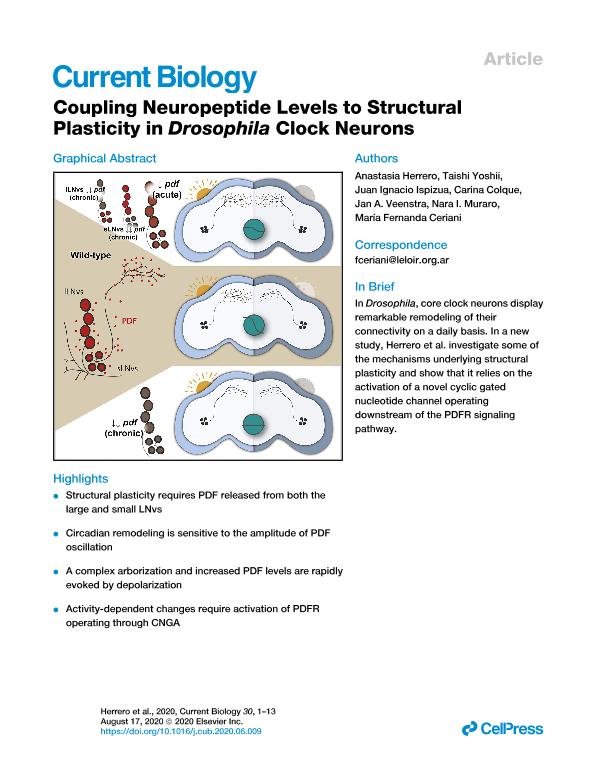Artículo
Coupling Neuropeptide Levels to Structural Plasticity in Drosophila Clock Neurons
Herrero, Anastasia ; Yoshii, Taishi; Colque, Carina Celeste
; Yoshii, Taishi; Colque, Carina Celeste ; Colque, Carina Celeste
; Colque, Carina Celeste ; Veenstra, Jan A.; Muraro, Nara Ines
; Veenstra, Jan A.; Muraro, Nara Ines ; Ceriani, Maria Fernanda
; Ceriani, Maria Fernanda
 ; Yoshii, Taishi; Colque, Carina Celeste
; Yoshii, Taishi; Colque, Carina Celeste ; Colque, Carina Celeste
; Colque, Carina Celeste ; Veenstra, Jan A.; Muraro, Nara Ines
; Veenstra, Jan A.; Muraro, Nara Ines ; Ceriani, Maria Fernanda
; Ceriani, Maria Fernanda
Fecha de publicación:
07/2020
Editorial:
Cell Press
Revista:
Current Biology
ISSN:
0960-9822
Idioma:
Inglés
Tipo de recurso:
Artículo publicado
Clasificación temática:
Resumen
We have previously reported that pigment dispersing factor (PDF) neurons, which are essential in the control of rest-activity cycles in Drosophila, undergo circadian remodeling of their axonal projections, a phenomenon called circadian structural plasticity. Axonal arborizations display higher complexity during the day and become simpler at night, and this remodeling involves changes in the degree of connectivity. This phenomenon depends on the clock present within the ventrolateral neurons (LNvs) as well as in glia. In this work, we characterize in detail the contribution of the PDF neuropeptide to structural plasticity at different times across the day. Using diverse genetic strategies to temporally restrict its downregulation, we demonstrate that even subtle alterations to PDF cycling at the dorsal protocerebrum correlate with impaired remodeling, underscoring its relevance for the characteristic morning spread; PDF released from the small LNvs (sLNvs) and the large LNvs (lLNvs) contribute to the process. Moreover, forced depolarization recruits activity-dependent mechanisms to mediate growth only at night, overcoming the restriction imposed by the clock on membrane excitability. Interestingly, the active process of terminal remodeling requires PDF receptor (PDFR) signaling acting locally through the cyclic-nucleotide-gated channel ion channel subunit A (CNGA). Thus, clock-dependent PDF signaling shapes the connectivity of these essential clock neurons on daily basis.
Archivos asociados
Licencia
Identificadores
Colecciones
Articulos(IBIOBA - MPSP)
Articulos de INST. D/INV.EN BIOMED.DE BS AS-CONICET-INST. PARTNER SOCIEDAD MAX PLANCK
Articulos de INST. D/INV.EN BIOMED.DE BS AS-CONICET-INST. PARTNER SOCIEDAD MAX PLANCK
Articulos(IIBBA)
Articulos de INST.DE INVEST.BIOQUIMICAS DE BS.AS(I)
Articulos de INST.DE INVEST.BIOQUIMICAS DE BS.AS(I)
Citación
Herrero, Anastasia; Yoshii, Taishi; Colque, Carina Celeste; Colque, Carina Celeste; Veenstra, Jan A.; et al.; Coupling Neuropeptide Levels to Structural Plasticity in Drosophila Clock Neurons; Cell Press; Current Biology; 30; 16; 7-2020; 3154-3166.e4
Compartir
Altmétricas



